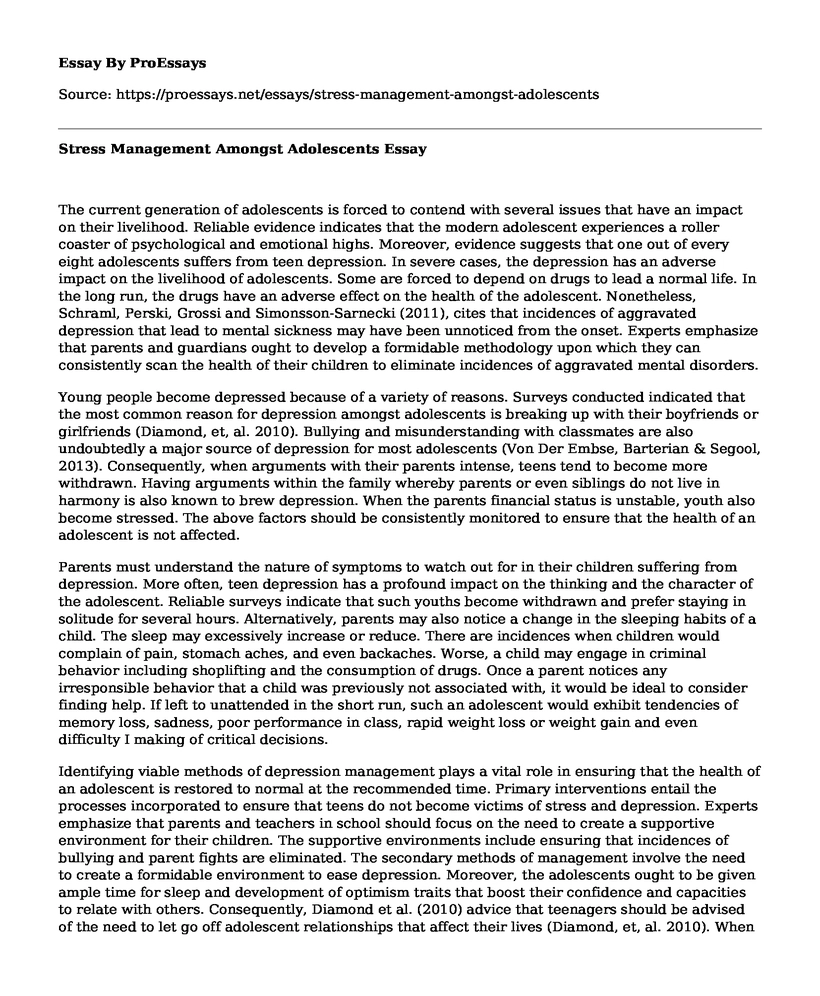The current generation of adolescents is forced to contend with several issues that have an impact on their livelihood. Reliable evidence indicates that the modern adolescent experiences a roller coaster of psychological and emotional highs. Moreover, evidence suggests that one out of every eight adolescents suffers from teen depression. In severe cases, the depression has an adverse impact on the livelihood of adolescents. Some are forced to depend on drugs to lead a normal life. In the long run, the drugs have an adverse effect on the health of the adolescent. Nonetheless, Schraml, Perski, Grossi and Simonsson-Sarnecki (2011), cites that incidences of aggravated depression that lead to mental sickness may have been unnoticed from the onset. Experts emphasize that parents and guardians ought to develop a formidable methodology upon which they can consistently scan the health of their children to eliminate incidences of aggravated mental disorders.
Young people become depressed because of a variety of reasons. Surveys conducted indicated that the most common reason for depression amongst adolescents is breaking up with their boyfriends or girlfriends (Diamond, et, al. 2010). Bullying and misunderstanding with classmates are also undoubtedly a major source of depression for most adolescents (Von Der Embse, Barterian & Segool, 2013). Consequently, when arguments with their parents intense, teens tend to become more withdrawn. Having arguments within the family whereby parents or even siblings do not live in harmony is also known to brew depression. When the parents financial status is unstable, youth also become stressed. The above factors should be consistently monitored to ensure that the health of an adolescent is not affected.
Parents must understand the nature of symptoms to watch out for in their children suffering from depression. More often, teen depression has a profound impact on the thinking and the character of the adolescent. Reliable surveys indicate that such youths become withdrawn and prefer staying in solitude for several hours. Alternatively, parents may also notice a change in the sleeping habits of a child. The sleep may excessively increase or reduce. There are incidences when children would complain of pain, stomach aches, and even backaches. Worse, a child may engage in criminal behavior including shoplifting and the consumption of drugs. Once a parent notices any irresponsible behavior that a child was previously not associated with, it would be ideal to consider finding help. If left to unattended in the short run, such an adolescent would exhibit tendencies of memory loss, sadness, poor performance in class, rapid weight loss or weight gain and even difficulty I making of critical decisions.
Identifying viable methods of depression management plays a vital role in ensuring that the health of an adolescent is restored to normal at the recommended time. Primary interventions entail the processes incorporated to ensure that teens do not become victims of stress and depression. Experts emphasize that parents and teachers in school should focus on the need to create a supportive environment for their children. The supportive environments include ensuring that incidences of bullying and parent fights are eliminated. The secondary methods of management involve the need to create a formidable environment to ease depression. Moreover, the adolescents ought to be given ample time for sleep and development of optimism traits that boost their confidence and capacities to relate with others. Consequently, Diamond et al. (2010) advice that teenagers should be advised of the need to let go off adolescent relationships that affect their lives (Diamond, et, al. 2010). When the primary and secondary methods of depression management fail, it would be ideal to consider tertiary methods of intervention. Tertiary methods may entail medication and psychotherapy. Therapies would be ideal as the effects may trickle down to the support system of an adolescent. Ideal nursing interventions in such cases would involve facilitating therapies as well as offering an ideal environment for recuperation. Nurses ought to create an environment whereby the patient can manage their feelings and thus change their perspective towards a pressing matter.
The modern adolescent is bombarded with issues that if not well managed have a profound impact on their health status. Suggesting lifestyle changes and offering a profound support system are some of the ways to ensure that adolescents do not suffer from stress. Poor stress management may trigger death. Thus, parents and instructors ought to be on the lookout for symptoms of depression amongst adolescents.
References
Diamond, G. S., Wintersteen, M. B., Brown, G. K., Diamond, G. M., Gallop, R., Shelef, K., & Levy, S. (2010). Attachment-based family therapy for adolescents with suicidal ideation: A randomized controlled trial. Journal of the American Academy of Child & Adolescent Psychiatry, 49(2), 122-131.
Schraml, K., Perski, A., Grossi, G., & Simonsson-Sarnecki, M. (2011). Stress symptoms among adolescents: The role of subjective psychosocial conditions, lifestyle, and self-esteem. Journal of adolescence, 34(5), 987-996.Von Der Embse, N., Barterian, J., & Segool, N. (2013). Test anxiety interventions for children and adolescents: A systematic review of treatment studies from 20002010. Psychology in the Schools, 50(1), 57-71.
Cite this page
Stress Management Amongst Adolescents. (2021, Apr 02). Retrieved from https://proessays.net/essays/stress-management-amongst-adolescents
If you are the original author of this essay and no longer wish to have it published on the ProEssays website, please click below to request its removal:
- Psychological Analysis of Movie With Mental Illness Paper Example
- Famous Teen Counseling: The Teen Star Paper Example
- Fire Incidence on Carnival's Cruise Ship "Splendor" Essay Example
- Research Paper on Stress and GPA: Relationship Investigated with 27 Students
- Annotated Bibliography Paper Example on Multicultural Counselling: Best Practices for Change
- Love Is Not Enough: Understanding the Complexities of Relationships - Essay Sample
- Paper Example on Social Inequality at California State University







